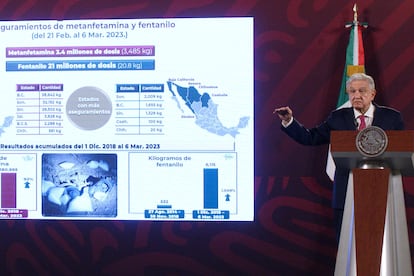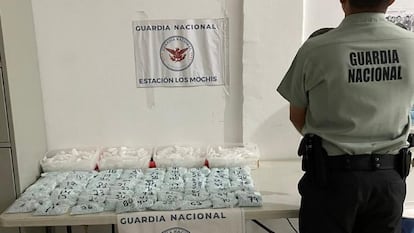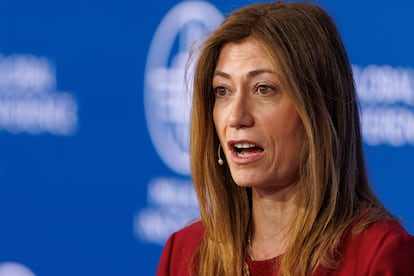López Obrador insists that Mexico does not produce fentanyl and claims that it comes from China: ‘We have proof’
The Mexican President announces that he will send another letter to the Government of Xi Jinping and will ask him to prevent the shipment of substances to the country, following the arrival of a container at the port of Lazaro Cardenas

A container with 600 bundles of drugs has fully entered the controversy between Mexico, the United States and China over the global trafficking of fentanyl. Andrés Manuel López Obrador asserted that the shipment, intercepted this week in the port of Lázaro Cárdenas, is the latest evidence that the substance is not produced in the country, but arrives as a finished product to be sold on the U.S. market. “We already have proof,” said the President in his daily press conference this Friday. The president announced that he will send a new letter to request the cooperation of Xi Jinping’s government in the anti-narcotics fight to identify suspicious shipments and prevent them from leaving Asia. “In a very respectful manner, we are going to send this information to reiterate the request that they help us,” said López Obrador.
The Secretary of the Navy, Rafael Ojeda, explained that the container detected in Lázaro Cárdenas, one of the main ports in the Mexican Pacific, had packages weighing between 34 and 35 kilos, in which traces of fentanyl and methamphetamine were found, camouflaged in a shipment of fuel resin. The cargo departed from the Chinese city of Qingdao and passed through the Busan port terminal in South Korea before reaching Mexican territory, according to authorities.
Ojeda said toxicological tests were conducted to determine the presence of the drugs, after an inspection with a team of trained dogs yielded “certain doubts.” “This takes time because a very deep analysis has to be done,” the admiral commented, adding that the shipment appeared “several weeks ago,” without specifying dates. “The product was contaminated,” the Navy secretary affirmed, after new chemical tests were carried out on Thursday.

In early April, López Obrador released a letter he sent to his Chinese counterpart asking for support to curb fentanyl trafficking, following weeks of tensions with lawmakers and US government agencies, such as the DEA and the State Department, who criticize his security policy and point to Mexico as the epicenter of the drug supply. Members of Congress from the most hardline wing of the Republican Party are seeking to revive a bill to designate Mexican cartels as terrorist groups, which would allow Washington to launch military operations on Mexican soil to hunt down criminal groups. López Obrador’s government has said the approach is inadmissible and outside international law. “We are not asking you for support in the face of these crude threats, but for humanitarian reasons to control this trafficking,” the Mexican president wrote in a two-page document.
China’s response came a couple of days later, through Mao Ning, a Foreign Ministry spokeswoman. Beijing, a geopolitical and commercial rival of the US, showed empathy and condemned “the hegemonic and bullying practices against the Mexican side,” but assured that “there is no so-called illegal fentanyl trafficking” between the two countries. “The problem of fentanyl abuse in the US has its roots in itself, and the problem is totally Made in the USA, American-made,” Mao, a third-ranking official, countered.
After Beijing’s response on April 8, the government of López Obrador launched a new question a couple of days later: “If it is not produced in China, then where?” Each side offers completely different versions.
Anne Milgram, director of the DEA, claimed this week that Mexican cartels play a preponderant role and control the illegal market. “There are two cartels, the Sinaloa Cartel and the Jalisco Cartel - New Generation, that are responsible for virtually all the fentanyl and methamphetamine that is consumed in the United States,” she said. Milgram said that for years now, Chinese partners of criminal organizations have stopped shipping fentanyl directly to the United States and have moved into the precursor trade, the substances from which the drug is made.

“They buy precursor chemicals from China, ship them to Mexico, mass-produce fentanyl, use much of it to make fake pills, and then smuggle it into the United States by land, air and sea,” she added. While tensions on both sides of the border soar, Milgram implied that the dialogue between the White House and the Chinese authorities remains deadlocked: “We know that China is not going to cooperate with us in the fight against narcotics.”
At the same time, the sons of Joaquín El Chapo Guzmán, the founder and historic leader of the Sinaloa Cartel, distanced themselves from the accusations of drug trafficking and organized crime against them, announced in the United States on April 14. “We have never produced, manufactured or marketed fentanyl,” Los Chapitos, as the drug lord’s heirs are known, said in a letter attributed to them and delivered by one of their father’s lawyers to the media. The kingpin’s heirs said they were “victims of a persecution,” although they did assert that “there are multiple people in Sinaloa who work with it [fentanyl].”
In the midst of the latest chapter of the US crusade against drugs, reproaches, disagreements and irreconcilable versions are surfacing. The United States points to Mexico and China as the world epicenters of fentanyl trafficking, a claim that has intensified with a view to next year’s presidential elections. The Mexican government refuses to be blamed, accuses a propaganda campaign and demands that its neighbor acknowledge its responsibility as a driver of demand. And the Chinese authorities have marked their distance, while a shipment of 600 packages of resin has once again stirred the waters.
Sign up for our weekly newsletter to get more English-language news coverage from EL PAÍS USA Edition
Tu suscripción se está usando en otro dispositivo
¿Quieres añadir otro usuario a tu suscripción?
Si continúas leyendo en este dispositivo, no se podrá leer en el otro.
FlechaTu suscripción se está usando en otro dispositivo y solo puedes acceder a EL PAÍS desde un dispositivo a la vez.
Si quieres compartir tu cuenta, cambia tu suscripción a la modalidad Premium, así podrás añadir otro usuario. Cada uno accederá con su propia cuenta de email, lo que os permitirá personalizar vuestra experiencia en EL PAÍS.
¿Tienes una suscripción de empresa? Accede aquí para contratar más cuentas.
En el caso de no saber quién está usando tu cuenta, te recomendamos cambiar tu contraseña aquí.
Si decides continuar compartiendo tu cuenta, este mensaje se mostrará en tu dispositivo y en el de la otra persona que está usando tu cuenta de forma indefinida, afectando a tu experiencia de lectura. Puedes consultar aquí los términos y condiciones de la suscripción digital.









































